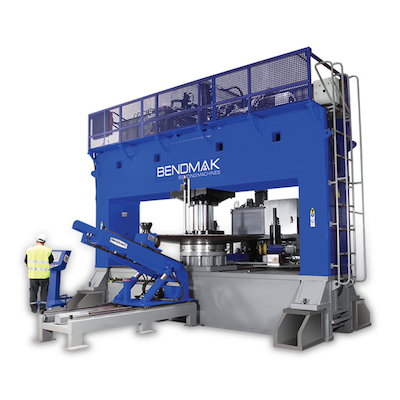
Posted By: Talip Tuzlular | Posted On: Dec 5, 2022 12:00:00 AM
CNC Metal Fabrication Machines, Angle Rolling Machines
Angle roll machines (aka profile or section bending machines) for metal fabrication are used to bend and form a wide variety of metals in numerous ways. They can be used to create a variety of shapes depending on the angle, radius, and size of the rolls. They are available in both manual and motorized models (such as CNC or NC angle rolling machines) and can be used for various applications such as angle iron rolling, T-section rolling, round or square bar, tube/pipe rolling, channel rolling, beam rolling, and more.
The basics of angle rolls
Modern angle rolling machines are incredibly versatile and offer tremendous speed and accuracy when forming metal profiles. They can be used to bend simple shapes such as circles, squares, and rectangles or more complex shapes such as cones or contours. The sophisticated features like hydraulic guide rolls, variable speed, and CNC capabilities on the machines allow for various speeds and degrees of pressure, which allows the operator to precisely control the amount of force applied to the materials. Angle rolling machines can also form edges accurately and quickly with minimal effort, making them an excellent choice for various fabrication jobs.
In addition, angle rolling machines can be combined with other machine tools such as press brakes, shears, and punches to create more intricate shapes. Angle rolling machines are an important part of any metal fabrication shop and can help increase productivity while reducing costs. With their precision and speed, angle rolling machines are a great asset for any business requiring metal fabrication services.
Common types of Angle Rolls
There are three different types of CNC angle roll machines that are commonly used in the industry. The first is the hydraulic type, which uses a hydraulic cylinder to deform the metal. The second is the mechanical type, which uses a screw mechanism to deform the metal. The third is the servo type, which uses a servo motor to deform the metal. Each type has its own advantages and disadvantages, so it is important for the user to choose the right machine for their specific needs.
CNC angle rolls can be used in a variety of industries, including automotive manufacturing, aerospace engineering, construction and metal fabricating. They also create curved or spiral shapes that would otherwise be impossible to produce with traditional manufacturing methods. CNC angle rolls can be used to form sheet metal into complex shapes, such as cones, cylinders and helixes, and flanges. The speed at which the operator can feed material through the machine will depend on the type of roll selected. For lighter materials such as aluminum or copper, a higher speed will be required to efficiently form the material into the desired shape. For heavier materials such as steel, a slower speed may be necessary to ensure that the parts come out correctly.
CNC angle rolls can also be used to bend solid metal into complex shapes. This is especially useful when creating components that need to fit precisely to function properly. By using a CNC angle roll, the operator can guarantee that their components match the required specifications precisely and quickly.
Additionally, CNC angle rolls are often used in the automotive industry to form large panels or body parts into complex shapes such as curves or circles. This ensures that each part is made to exact specifications and helps reduce scrap or waste.
In addition to hydraulic, mechanical, and servo, three rolling options are industry standard:
- Single-Pinch Angle Rolls
- Double-Pinch Angle Rolls
- Pressing Angle Rolls
Single-pinch
Single pinch angle rolls are a type of rolling machine which uses the principle of bending metal by passing it through two consecutive pairs of driven rolls. This type of rolling process is often used to produce curved sections for products such as stairs, guard rails, and balconies. Single pinch machines require only one pass through the two sets of rolls in order to produce the desired bend. This makes them more efficient and cost-effective than multi-pinch machines which require multiple passes. Single pinch angle rolls are also often used to roll sheet metal for construction projects and other fabrication applications.
The angle of the bend can be adjusted by adjusting the distance between the two pairs of rolls, and the rollers themselves can be adjusted to roll different sizes and thicknesses of material. Single pinch angle rolls can also be used to create complex curved sections from flat sheet metal or to create a variety of shapes such as circles, ellipses, spirals, and more. When used properly, single-pinch machines are an invaluable tool for fabricators in many different industries.
Single pinch angle rolls can save time and money, making them a great choice for any fabrication project. They are easy to operate, and they can provide reliable performance for many years with proper maintenance. Single pinch angle rolls also offer versatility in that they can be used to produce any number of curves or shapes from flat sheets of metal.
Double-pinch
A double-pinch angle roll is a type of welding that uses two pinches of the welding material to create an angle. This type of weld is often used to manufacture pipes and other cylindrical objects. The angle created by the two pinches helps distribute the heat evenly across the welded object, resulting in a stronger and more durable weld.
Pressing rolls
A press angle roll is a tool that is typically used in a steel mill. It is used to form angles and bends in the steel. The press angle roll is a large piece of equipment that heavy-duty steel is run through to create bends and angles.
Considerations when using CNC Angle Roll Machines for Metal Fabrication
Most modern angle rolling machines are hydraulic as they are much more efficient and precise compared to the other types. If the angle rolling machine is not used for higher volume production and precision is not a big concern, then smaller mechanical angle rolling machines can be a good option for the users. This would all depend on the needs of the shop. At BendmakUSA, our experts are great at determining the needs of businesses and offering the right solutions.
Strength-Yield Ratings
All angle rolling machines have a strength-yield rating. The term of strength yield refers to the pressure an angle rolling machine can apply at any given time into the material. An angle rolling machine for forming metal sections typically has between 36,000 and 38,000 pounds per square inch (PSI) of pressure. The types of metal an angle rolling machine can bend depend on its weight capacity. Some angle rolling machines are built to handle industrial-grade steel, while others can only process softer metals such as stainless steel tubing, aluminum, and copper alloys.
New vs. Used Angle Roll Machinery
You need to make a product by forming metal parts and wonder if you would be better off with a brand-new angle rolling machine purchase or used one? Many factors need to be considered, and it all depends on the specific needs of your business. However, a new machine purchase has many advantages, such as a frame warranty, parts warranty, service support, availability, up-to-date technology, and more resources and literature for the operators. Paying more for a new machine upfront may save you much more than you paid in the long run.
A used machine may be a good option as long as the condition of the machine is satisfactory and the price is right. At BednmakUSA, our price/quality ratio is one of the best in the market. You can find the angle rolling machines you need at https://www.bendmakusa.com/machines/angle-rolls?We can also offer to take your old angle rolling machine in trade and get you a brand-new Bendmak angle rolling machine. Further, we can provide guidance in buying new machines through our application support and even provide financing to help you get the right machine for your needs and budget. We are consultants and partners, the best of both worlds as a metal fabrication machinery supplier!
Related Content: Everything You Need to Know About Dishing & Flanging Machines
Conclusion
Angle rolling machines for sheet metal fabrication are built differently, but in principle, they all offer similar features. What sets Bendmak apart is the fact that we listen to you and customize a solution that fits your needs perfectly.



